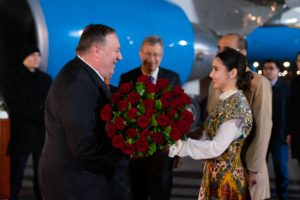U.S. Secretary of State Mike Pompeo’s early February visit to Kazakhstan and Uzbekistan marks a notable achievement for Central Asia: The United States is keeping an active eye on the region. An increased number of visits to the former Soviet republics has occurred in recent years, with U.S. officials voicing interest in strengthening relations. The State Department declared in a December special briefing that it had “intensified [its] bilateral diplomatic engagements with Central Asia” this past year. However, the Trump administration may experience a difficult time with its current strategy if key parties are not involved. During the meeting between the foreign ministers of all five Central Asian republics and Pompeo earlier this month, one important regional power not only was absent, but was negatively singled out – China.
The former Soviet republics in Central Asia have tended to pursue foreign policies characterized as “neutral” or “multivector,” terms that essentially mean the countries look to build their sovereignty, independence, and prosperity without annoying or becoming dependent on any major global power. As they have become more self-confident, the region’s leaders have begun to promote the value of regional cooperation, as well as, in a number of cases, historic reforms. These developments have attracted international attention. This was evident from the dialogue at early February’s meeting of the Central Asian leaders; in addition to conversations with Pompeo, they discussed joint border security and regional efforts to improve economic and energy connectivity among each other and with neighboring countries, something which inevitably includes China. Pompeo seemed quite wary of the conversational inclusion of Beijing, and did not shy away from expressing his thoughts on the region’s eastern neighbor. He even declared the Chinese Communist Party the “the central threat of our times” during a visit to London to kick off the trip that ended in Central Asia.
On the economic front, China has heavily pivoted to Central Asia in the past decade, and recognized the region as the backbone of the Belt and Road Initiative’s “Silk Road Economic Belt” – an overland network of infrastructure corridors that connect Chinese goods to European consumers via Central Asia. Billions in joint venture investments were made to develop Caspian Sea hydrocarbon fields, and Kazakhstan has some of the region’s largest reserves of oil and gas. In a reflective example of current U.S.-Chinese relations, Pompeo cautioned the Central Asian countries not to become overly dependent on Beijing and criticized Chinese business and lending practices.
Pompeo emphasized that Kazakhstan, and Central Asia as a whole, would “get the best outcome” by partnering with American companies. Although that was spoken with a tone stressing the opportunities, the United States will find itself in an unusual predicament because it previously distanced itself from what has also been part of Russia’s historical sphere of influence. The White House and Central Asia may be entering a “new era of strategic partnership,” despite the United States’ long-time position of not competing with the region’s neighboring forces. But a new moniker will mean nothing for Central Asia if not free from Chinese and Russian influence.
It should come as no surprise to the Trump administration that the former Soviet states will continue to foster the regional relations that helped establish them over the years. China’s presence must be viewed as an opportunity for collaboration rather than a fight for domination. Central Asia will generally welcome — and want — U.S. attention, but will want a degree of circumspection.
Former Deputy Assistant Secretary for Central Asia in the Bush administration Evan A. Feigenbaum told VOA recently that the United States can “support the countries by leveraging uniquely American strengths.” While Central Asia looks to expand relations with the United States, they acknowledge that it may come at a cost – as they have benefited thus far from Chinese engagement. Washington’s best approach is to act as an additional option for local governments as they face coercion or persuasive measures from China and Russia. If Central Asia is looking to find a counterbalance in their diplomatic and economic relations, then the United States may prove to be a powerful ally.
Kristen Cheriegate is currently the managing director of Caspian Affairs, a magazine produced by the Caspian Policy Center. She also works in Denver, Colorado as the communications and policy advisor to the majority leader in the State Senate.

































